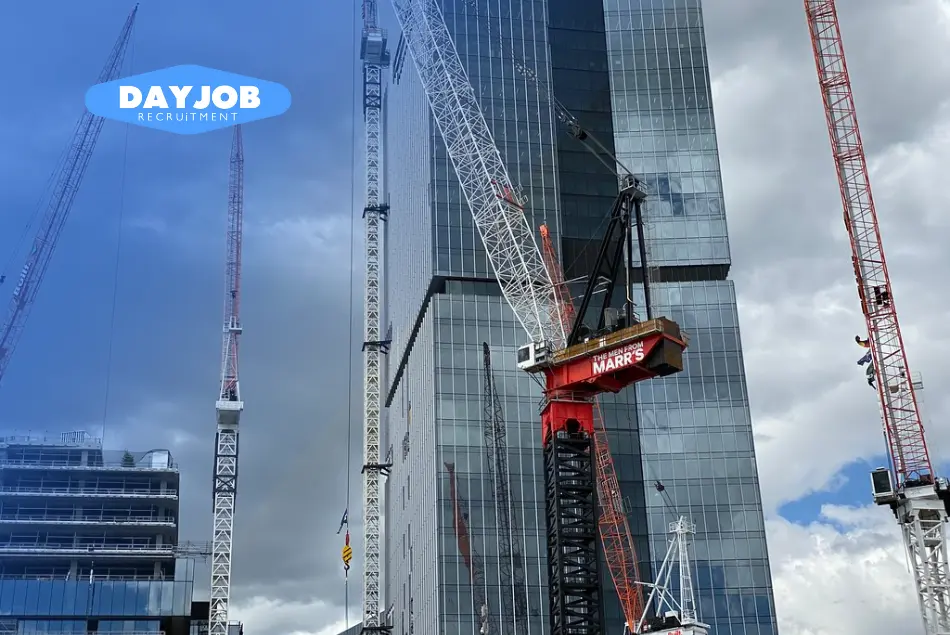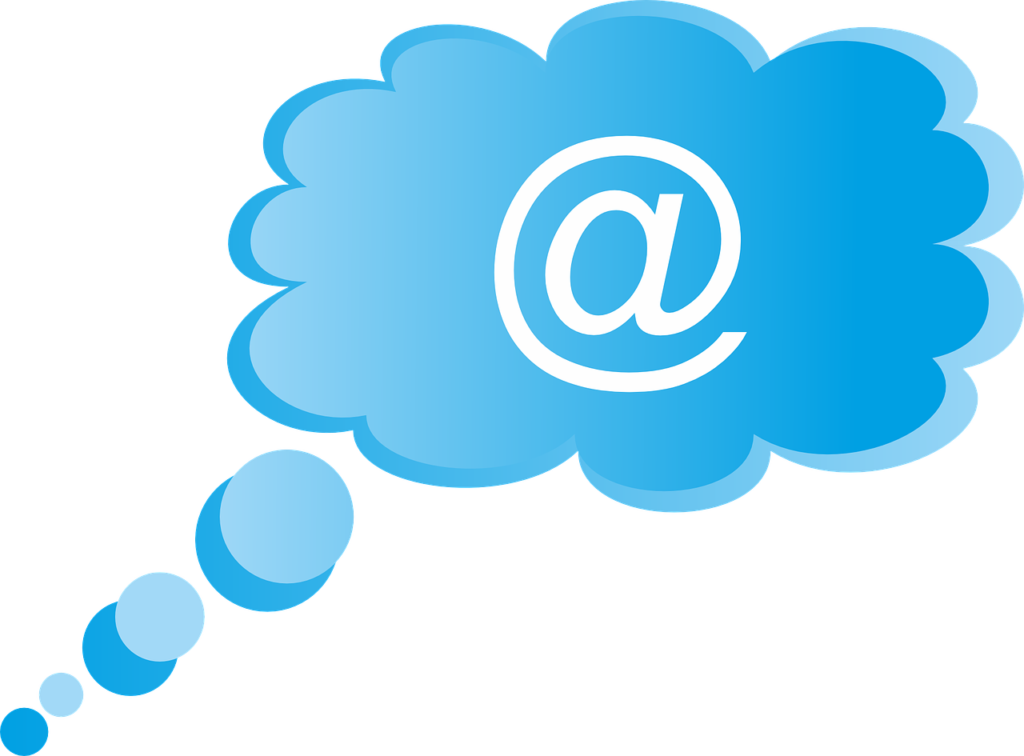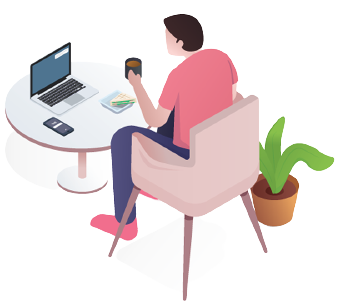In the post-pandemic world, online job interviews have become increasingly popular as a first step toward landing your dream job.
We at Dayjob Recruitment know what it takes to ace an interview, as well as how to answer interview questions and what recruiters expect, so let us walk you through the most important steps and considerations of preparing for an online job interview.
The online job interview is often a first step before talking with the employer in person, so it’s essential to prepare for it to get it right the first time.
We’ve divided this article into 4 subsections, so you can easily follow all interview tips, to impress the hiring manager and nail the interview! You can click on each one of them, to avoid scrolling.
1) Interview Tips for Professional Appearance
2) Interview Tips for Understanding the Company
3) Interview Tips to Avoid Technical Problems
4) Post-Interview; Job Interview Tips

We’ve listed 18 practical job interview tips, to get you past the first interview and land your dream career.
1) Interview Tips for Professional Appearance
Look Into the Camera and Maintain Eye Contact
Keeping eye contact with the hiring manager is intuitive during a traditional, in-person, interview process. This is not the case in a video interview.
Make sure that you maintain eye contact with the recruiter while you speak. Psychologically, it gives the impression that you are interested in the conversation.
Positive Body Language and Appearance
Yes, body language and appearance are vital for an online job interview. Like in an in-person interview, you’ll want to dress professionally and look orderly to make a good impression.
Even though the interview is online, it’s still a formal business interaction. So ensure you pay attention to your body language, your clothing is clean, pressed, and appropriate for the current job, and the company culture.

Pick the Right Interview Location
Location is vital for an online job interview. You’ll want a quiet, well-lit space to talk without interruptions or distractions. Ensure that your internet connection is stable to avoid any technical glitches during the discussion. Choose an area where you feel comfortable and confident, and make sure there’s nothing in the background that could be distracting or unprofessional. A neutral backdrop can also help keep the focus on you, ensuring your skills and qualifications are the center of attention.
2) Interview Tips for Understanding the Company
Interview Preparation
Before the interview, make sure you’ve thoroughly read the job description, visited the company website, and understood the company culture, history, and services. You might want to do a Google search to check the company’s history, press releases, and reputation.
It’s essential to prepare early for the job interview, to test your microphone, headset, and webcam. Plan to arrive at least 5 minutes early. First impression counts.
Review the Job Description
It’s crucial to have a thorough understanding of the job description for the position you’re applying for. It’s more than just a list of tasks; it’s a roadmap to what the company expects from its future employees. By going through the job ad, you can identify the key skills, responsibilities, and qualifications the employer values most.
This insight allows you to tailor your responses during the interview to highlight how your experience and skills align with their needs. Additionally, understanding the job role in-depth can help you formulate meaningful questions for the interviewer, demonstrating your genuine interest in the position and showcasing that you’ve done your homework.
Answer Interview Questions
It’s crucial to provide clear, concise, and well-thought-out responses. Take a moment to comprehend the question fully before diving into your answer. Relate your responses to specific experiences or skills that align with the job description. This not only showcases your qualifications but also demonstrates your ability to reflect and apply past learnings.
Always be honest; if you don’t know the answer to a question, it’s better to admit it than to fabricate a vague response. Interviewers appreciate authenticity and the ability to recognize one’s areas for growth. Lastly, practice active listening. By doing so, you ensure you’re addressing the interviewer’s queries directly and showcasing your engagement in the conversation.

Research the Organisation
While it’s essential to understand the role you’re applying for, it’s equally crucial to research the company’s values, mission, and recent developments. Companies appreciate candidates who resonate with their ethos and vision.
Dive deep into the company’s website, read its mission statement, Google for the latest press releases, check out its social media profiles, and get a sense of its corporate culture. This will also equip you with questions you might want to ask the interviewer, showcasing your genuine interest in the organization as a whole.
Prepare for Interview Questions
Even most experienced and seasoned candidates should prepare for interview questions. It’s important to put yourself into the hiring manager’s shoes and think what could be the interview questions. It allows you to practice and therefore, give more detailed answers. Interviewers talk to many candidates a week, and giving a great impression during the first job interview is essential to stand out.
We’ve listed some common interview questions below.
Frequently Asked Questions in a Job Interview
- Can you tell me a little about yourself?
- Why are you interested in this position?
- What are your greatest strengths and weaknesses?
- What motivates you in your work?
- What do you know about our company/industry?
- What are your long-term career goals?
- Why did you leave your last company?
- Describe a stressful situation in your previous job and how you handled it.
- Describe a project that you’re particularly proud of. What was your role and contribution?
Questions About Your Current Job
When discussing your current job or past experiences, having your resume and portfolio at hand can be incredibly beneficial. In an online interview setting, you have the advantage of quickly pulling up any relevant documents to showcase or clarify points. Ensure that all your files are organized and easily accessible. This not only demonstrates your professionalism but also your attention to detail.
Furthermore, being able to visually present examples of your work or achievements can make your explanations more compelling. Always remember, in a competitive job market, every small detail can set you apart.
Salary Expectations

Yes, it’s a good idea to think before the meeting about your salary expectations. When you work with a recruitment company, interviewers can negotiate the salary for you, but it’s a great idea to have a clear expectation of your compensation, to land the best job offer possible.
Being well-researched about the industry standard for your role and having a set range in mind can streamline the negotiation process and demonstrate your market awareness.
Duration of the Interview
The duration of an online job interview can vary greatly. For example, some discussions may only last 15-30 minutes, while others may take up to an hour or more. Therefore, it’s essential to be prepared to answer questions concisely and effectively while allowing enough time to articulate your responses thoroughly. You should free up a minimum of 60 minutes for the job interview.
3) Interview Tips to Avoid Technical Problems
Using a Headset

We recommend using a headset for the online meeting. Using it properly assures you can hear the person on the other side. It’s essential to select the right Microphone and Speaker from the Settings. Using the correct settings removes your background noise and ensures your audio is clear.
Internet Connection and the Format

Ensure you have a reliable internet connection and a quiet, well-lit space to talk to without interruptions. Test your equipment beforehand to ensure your microphone and webcam are working correctly. If you’re using a video conferencing platform that you’re unfamiliar with, practice interviewing and test the software with a friend or family member.
Most video conferencing platforms have a virtual meeting room which allows you to test your mic and webcam prior the interview starts.
Online job interviews can vary in format, depending on the company and the particular position itself. For example, some employers may use a video conferencing platform like Zoom, Google Meet or Microsoft Teams, while others may use pre-recorded video or phone interviews. Make sure to download and test the software beforehand to ensure everything is working.
Sharing Your Screen
Sometimes, sharing your computer screen with the hiring manager is handy. It might be the case if you want to show your location, updated resume, past projects you’ve worked on, or anything else you find important. If that’s the case, then before the interview, we recommend closing all applications on your computer and clearing up your desktop so it looks professional.
Time Zone Considerations

Time zone can be a factor for an online job interview, especially if you’re interviewing with a company in a different region or country. Make sure you’re clear on the time and date of the interview, and adjust your schedule accordingly. If you need clarification on the time difference or need to schedule, use an online time zone converter to avoid confusion.
4) Post-Interview; Job Interview Tips
Thank You Note

Once the interview concludes, taking a moment to send a thank you note to the hiring manager can make a lasting impression. This simple act of gratitude not only showcases your professionalism and manners but also reinforces your genuine interest in the position. A thoughtfully crafted note can further emphasize how you align with the company’s values and culture.
Next Job Interview
The second interview could very well be the final round, often conducted in person. This stage is crucial as it’s typically the deciding factor for your potential employment. Given its significance, prepare thoroughly. Get feedback or points from the recruiter from the previous rounds and prepare deeper, more specific questions related to the role and the company.
It’s also a prime opportunity to meet potential colleagues and experience the work environment firsthand. Dress appropriately, arrive ahead of time, and remember to carry any necessary documents or references.
This final interview is not just for the employer to evaluate you but also for you to assess if the company aligns with your career goals and values.
Are you a job seeker looking for your next big opportunity? Click below to see how we can assist you in finding the perfect role.
Most Important Takeaways
- Check your software, hardware, and internet connection timely before the interview.
- Use a headset with the correct settings.
- Prepare your questions about the role.
- Research about the company.
- What are the questions the hiring manager will ask?
- Be attentive, and responsive and ask questions.
- Most importantly, remain calm, smile, and don’t over stress it.
Our Recommended Reading List

- “Cracking the Coding Interview: 189 Programming Questions and Solutions” by Gayle Laakmann McDowell
- “How to Win Friends and Influence People” by Dale Carnegie
- “The 7 Habits of Highly Effective People” by Stephen R. Covey
- “The Lean Startup: How Today’s Entrepreneurs Use Continuous Innovation to Create Radically Successful Businesses” by Eric Ries
- “Succeeding with Emotional Intelligence” by Daniel Goleman
FAQs
1. What should I prepare for an online interview?
Test your technology in advance, choose a quiet and well-lit space, and ensure your background is professional. Dress appropriately and have a copy of your resume and job description handy.
2. How can I impress an interviewer online?
Be punctual, maintain eye contact with the camera, demonstrate knowledge about the company and the role, and communicate clearly and confidently.
3. How do you introduce yourself in an online interview?
Start with your name, briefly describe your professional background, mention your current role or a recent project, and express your enthusiasm for the position you’re interviewing for.
4. What should I answer for the online interview?
Focus on experiences that showcase your skills and achievements relevant to the job. Use the STAR method (Situation, Task, Action, Result) for behavioural questions and prepare questions to ask the interviewer.
5. How long do job interviews last?
Interviews typically last between 30 minutes to an hour, depending on the role and the interview stage. Initial screens may be shorter, while in-depth interviews or panels may take longer.








